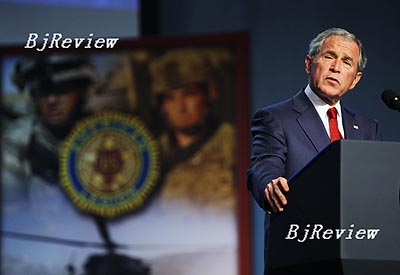
Iranian President Mahmoud Ahmadinejad's remark on August 28 that Iran was determined to continue its nuclear program despite opposition from some "big powers" stoked the fires of contention with the United States, which opposes his plan to build up Iran's nuclear capabilities. Ahmadinejad further enraged Washington when he said that although Iran was not interfering in Iraq's affairs at present, his country was ready to work with neighbors such as Saudi Arabia to fill the power vacuum that eventually would appear in Iraq when the Americans withdrew.
That same day, while addressing a veterans group in Reno, Nevada, U.S. President George W. Bush shot back that Iran's actions threatened the security of nations everywhere and put some countries "under the shadow of a nuclear holocaust." Bush said that the United States, which believes that Iran intends to use nuclear power for weapons, was ready to confront the danger. He then accused Iran of being the world's "leading state sponsor of terrorism" and demanded that it stop supporting extremists in Iraq. In response, the United States was rallying its allies to isolate Iran's regime and impose economic sanctions, Bush said.
After Bush's comments, Tehran threatened on September 2 to change its mind on cooperating with the International Atomic Energy Agency (IAEA) if the UN Security Council issued a new resolution against it. Iran would "study various options" on a possible new UN resolution, said Iranian Foreign Ministry Spokesman Mohammad-Ali Hosseini at a press conference. In response to Bush's warning of a so-called nuclear holocaust, Hosseini said, "We will reject any remarks which are far from logic and the existing realities. … There were various parts in President Bush's speech in which he repeated all his previous unfounded accusations against Iran."
War looming large
With this renewed spate of tough talk, international affairs experts wonder if an armed conflict between the two countries might erupt soon. Despite previous attack threats by the United States, the situation has become more serious, they said.
Yin Gang from the Chinese Academy of Social Sciences said that the possibility of a U.S. attack on Iran was much greater than three months ago. The attitudes of both countries show that there is a slight chance that the two can sit together and talk, he said.
Other events point in this direction. On September 1, Ayatollah Ali Khamenei, Iran's supreme leader, appointed a new head of the Islamic Revolutionary Guards Corps, which operates its own ground, navy and air forces. The corps runs parallel to Iran's regular army, but responds directly to Khamenei. Because the new chief, Brigadier General Mohammad Ali Jafari, has had previous war experience, it seems that Iran is preparing for a possible war as well, Yin said.
According to a report in the British newspaper The Sunday Times, a high-ranking official in the Bush administration said the U.S. Government was planning to declare Iran's Islamic Revolutionary Guards Corps a foreign terrorist organization and was going to strike at its financial and military capabilities. The Sunday Times report also said that Washington would state its position on this matter before the UN General Assembly in September. If true, this would be the first time that the U.S. Government included a sovereign state's military army on its list of terrorist organizations.
In recent months, U.S. legislators have debated whether diplomacy alone can put the lid on Iran's nuclear plans. Hardliners have taken a firm stance and opposed talks between the two countries, because they don't think diplomacy will work. By listing the Islamic Revolutionary Guards Corps as a terrorist organization, the Bush administration was able to reassure these hawks and prompt allies like Britain to ask the UN Security Council to pass a new resolution to punish Iran.
| 